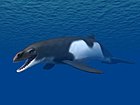Fucaia
| Fucaia Temporal range: Oligocene
| |
|---|---|
| Scientific classification | |
| Domain: | Eukaryota |
| Kingdom: | Animalia |
| Phylum: | Chordata |
| Class: | Mammalia |
| Order: | Artiodactyla |
| Infraorder: | Cetacea |
| Family: | †Aetiocetidae |
| Genus: | †Fucaia Marx, Tsai, and Fordyce, 2015 |
| Type species | |
| †Fucaia buelli | |
| Species | |
| |
Fucaia is an extinct genus of primitive baleen whale belonging to the family Aetiocetidae that is known from Oligocene and latest Eocene marine deposits on Vancouver Island, Canada, the Olympic Peninsula, Washington State, and Oregon.[2]
Taxonomy
[edit]Three species are now recognized; F. buelli, F. goedertorum (Barnes et al. 1995), and F. humilis. Fucaia humilis is latest Eocene in age and thus the oldest mysticete in the Northern Hemisphere, F. buelli is of early Oligocene (Rupelian) age, while F. goedertorum is younger. The latter was originally described as a species of Chonecetus before it was recognized as more closely related to buelli than to the Chonecetus type species.[3][4]
Biology
[edit]The tooth structure of Fucaia indicates that it was capable of both raptorial feeding and suction-feeding, like other aetiocetids.
Sister taxa
[edit]References
[edit]- ^ Tsai, Cheng-Hsiu; Goedert, James L.; Boessenecker, Robert W. (2024-03-28). "The oldest mysticete in the Northern Hemisphere". Current Biology. 34: 1–7. doi:10.1016/j.cub.2024.03.011.
- ^ "Data on the geographic and temporal distribution of cetacean genera". Paleo-Electronica.org. February 2007. Retrieved 2008-07-01.
- ^ F. G. Marx, C.-H. Tsai, and R. E. Fordyce. 2015. A new Early Oligocene toothed ‘baleen’ whale (Mysticeti: Aetiocetidae) from western North America: one of the oldest and the smallest. Royal Society Open Science 2(12):150476
- ^ L. G. Barnes, M. Kimura, H. Furusawa and H. Sawamura. 1995. Classification and distribution of Oligocene Aetiocetidae (Mammalia; Cetacea; Mysticeti) from western North America and Japan. The Island Arc 3(4):392-431




